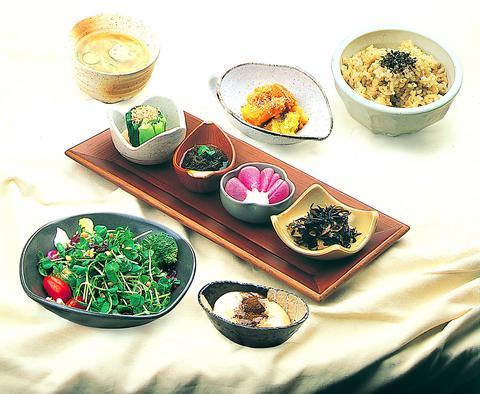Although its roots are in eastern philosophy, macrobiotics is a rarity in Taiwan. Increasingly trendy in the US and Europe, macrobiotics is the practice of balancing each meal with organic foods that are categorized as either Yin (more sweet) or Yang (more salty), similar to the Chinese system of labeling foods as either hot or cold.
The ultra-healthy diet gained popularity when it was exported to the West by Japanese businessman George Ohsawa in the early 1900s.

PHOTO COURTESY OF YOGI HOUSE INTERNATIONALN
A lot of people turn their noses up at macrobiotic meals because they assume the food will have no flavor, said Yogi House owner Tu Shu-feng (涂淑芬).
Tu's is the first purely macrobiotic restaurant to open on the island and although a meal of organic vegetables, beans and whole grains might sound too healthy to be appetizing, the set dinners offer some of the tastiest dishes in the city.
The meal consists mostly of whole grain starches, then vegetables and fruit and only a small meat, seafood or bean portion. A macrobiotic diet is not strictly vegetarian, but meat and dairy are often substituted with a soy-based product.
Main courses at Yogi House consist of a selection of noodle dishes including Japanese soba or sesame noodles, a long list of hot pots such as spicy-sour Thai with soy milk, and a few unique offerings like pumpkin burgers or tropical curry.
Tu recommends the macro classics to anyone wanting to sample a typical macrobiotic meal. Served with four vegetable side dishes, which vary depending on the season, the classic combines both steamed pumpkin and a bowl of long-grain brown rice as its starch base. The vegetable portions are small, but each is served in its own distinctly flavored sauce. On this particular visit, the veggies included marinated shitake mushrooms, stewed carrots and bamboo, seaweed in grape vinegar and sweet potato leaves in a sesame paste.
The second most popular and highly recommended dish is the pumpkin burger, which is actually more like a sandwich made with mashed pumpkin, lettuce, tomato and served on multi-grain bread. It also comes with a side order of pasta that uses a fresh tomato and basil sauce.
A little more than two weeks since its opening, Yogi House might not be the only macrobiotic restaurant for long. Having studied in Japan, Tu is currently offering prospective restaurant owners lessons on how to prepare the meals. Given the growing number of organic groceries and eateries in Taipei city, macrobiotics may well be one fad that lingers on.

The primaries for this year’s nine-in-one local elections in November began early in this election cycle, starting last autumn. The local press has been full of tales of intrigue, betrayal, infighting and drama going back to the summer of 2024. This is not widely covered in the English-language press, and the nine-in-one elections are not well understood. The nine-in-one elections refer to the nine levels of local governments that go to the ballot, from the neighborhood and village borough chief level on up to the city mayor and county commissioner level. The main focus is on the 22 special municipality

The People’s Republic of China (PRC) invaded Vietnam in 1979, following a year of increasingly tense relations between the two states. Beijing viewed Vietnam’s close relations with Soviet Russia as a threat. One of the pretexts it used was the alleged mistreatment of the ethnic Chinese in Vietnam. Tension between the ethnic Chinese and governments in Vietnam had been ongoing for decades. The French used to play off the Vietnamese against the Chinese as a divide-and-rule strategy. The Saigon government in 1956 compelled all Vietnam-born Chinese to adopt Vietnamese citizenship. It also banned them from 11 trades they had previously

Jan. 12 to Jan. 18 At the start of an Indigenous heritage tour of Beitou District (北投) in Taipei, I was handed a sheet of paper titled Ritual Song for the Various Peoples of Tamsui (淡水各社祭祀歌). The lyrics were in Chinese with no literal meaning, accompanied by romanized pronunciation that sounded closer to Hoklo (commonly known as Taiwanese) than any Indigenous language. The translation explained that the song offered food and drink to one’s ancestors and wished for a bountiful harvest and deer hunting season. The program moved through sites related to the Ketagalan, a collective term for the

As devices from toys to cars get smarter, gadget makers are grappling with a shortage of memory needed for them to work. Dwindling supplies and soaring costs of Dynamic Random Access Memory (DRAM) that provides space for computers, smartphones and game consoles to run applications or multitask was a hot topic behind the scenes at the annual gadget extravaganza in Las Vegas. Once cheap and plentiful, DRAM — along with memory chips to simply store data — are in short supply because of the demand spikes from AI in everything from data centers to wearable devices. Samsung Electronics last week put out word